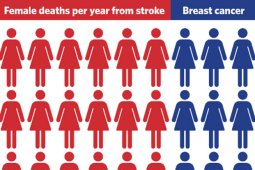Women and stroke- World Stroke Day
Apr 19, 2022
Stroke is the fifth leading cause of death in men but in women it is third leading cause. Most of the women are not aware of these facts that each year stroke kills twice as many women as breast cancer. In general women have longer life than men, leading to more negative impact of stroke on their life.
Signs and symptoms of stroke in women:
It is extremely important to recognize stroke onset. Most of the symptoms of stroke are same in men and women :
- Sudden onset weakness or numbness of the face, arm or leg, especially on one side of the body.
- Sudden onset slurring of speech, understanding problem or confusion.
- Sudden onset blurred vision in one or both eyes
- Sudden onset loss of balance or coordination
Women may have few unique symptoms not often associated with strokes in men -sudden onset hiccups with chest pain, dizziness, headache, face and limb pain etc. These unusual symptoms especially in women can delay the treatment.
Unique Risk factors in women

General risk factors are same for men and women – Hypertension, Diabetes, smoking, obesity, family history of stroke. Few unique risk factors, which are seen in women only, are pregnancy, use of oral contraceptives and hormonal replacement therapy. Autoimmune disorders are associated with high incidence of stroke and these disorders are more commonly seen in women.
Stroke prevention and early treatment in women
Stroke is traditionally thought of as a neurological illness mainly occurring in males, however there are unique risk factors that may additionally cause stroke in women. Risk factors identification, its modification and treatment are of paramount importance in preventing stroke in women. Blood pressure control and sugar monitoring should be done during pregnancy. During post partum period, women must be kept well hydrated. Every woman must be screened for hypertension before starting oral contraceptives or hormonal replacement therapy. Autoimmune disorders should be diagnosed and treated properly to prevent its CNS complication.
Anyone having early symptoms of stroke, need to be rushed to the hospital emergency as early as possible because clot bursting drug tissue plasminogen activator (t-PA) could be given only up to 4.5 hrs of onset of stroke symptoms. Early identification of stroke symptoms, coming to emergency department without delay, fast evaluation by doctor, brain imaging and early start of treatment are the key points of stroke treatment.









